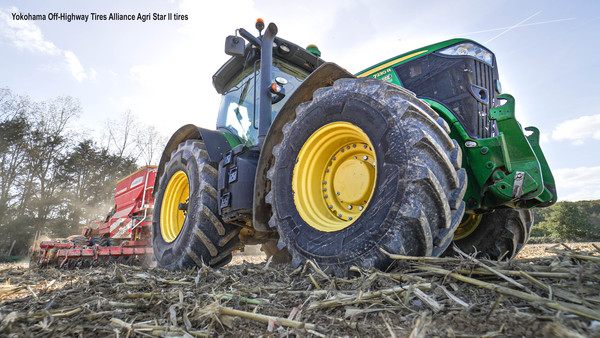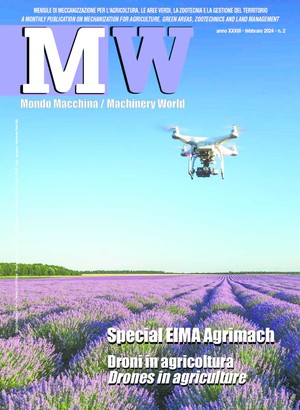
European agricultural tyre market falls
European tire market down 22% in 2022. In the sales ranking Italy confirms its third position. India and Japan increasingly global players
The figures from the European Tyre and Rubber Manufacturers' Association (Etrma) are all too clear.
The agricultural tyre market in the Old Continent is shrinking. Rather noticeably. After a 2021 that was not extraordinary, but all in all not concerning (a drop of around 3% at the end of the year), the decline in 2022 was much more marked: -22% at the end of the year, with -36% recorded in the last quarter of 2022. It is true that Etrma does not include all the major manufacturers (Apollo Tyres, Bridgestone Europe, Brisa, Continental, Goodyear, Hankook, Marangoni, Michelin, Nexen Tire Europe, Nokian Tyres, Pirelli, Prometeon, Sumitomo Rubber Industries and Trelleborg Wheel Systems are members), but the trend is clear and symptomatic of a market that is not entirely healthy.
In 2022 the replacement tyre segment fell below 1 million units, from over 1.2 million to 950,000 units, a negative figure resulting from a fourth quarter of 2022 in which the number of units fell from 249,000 in 2021 to 159,000. And the trend even in these early months of 2023 does not seem expansive and seems to confirm a certain general slowdown. Adam McCarthy, secretary general of Etrma, in an official note from the Association tries to 'justify' the contraction. "The war in Ukraine and the resulting increase in energy prices and cost of living have undoubtedly had a negative impact on replacement tyre sales in 2022. In practically all European countries." In this scenario, Italy confirmed its third place in the spare tyre sales ranking behind the two leading markets (Germany and France, which, moreover, have sales figures almost double those of Italy). In Italy however, is abandoning the idea cherished in the 2019-2021 three-year period of touching 100 thousand units per year and is holding just above 70 thousand units sold. In this landscape, which is roughly reflective, the balance sheet figures of all major market players are surprising. Virtually in unison, they have improved significantly. Turnovers registering double-digit growth (most often with increases of over 20%) and profits moving on the same wavelength.
McCarthy is probably right. Price increases have acted as a driving force and groups have 'taken advantage' both to improve accounts and to rationalise expenses and transport costs. On the strength of these results, the leading manufacturers continue to invest in a market that increasingly speaks Asian languages. If it is true that Michelin, in addition to being the world's leading tyre manufacturer in an absolute sense, remains the benchmark in the agricultural field, the brand of reference, and one of the few to have its heart and head in Europe, and that Goodyear has its true target in the United States, it is equally true that the Indian and Japanese brands do not seem to be stopping their race. In Europe (and Italy) in particular. Some through agreements or acquisitions. Some through internal growth. This is the case of Bkt (see article in this issue of the magazine), which has denied any agreement or investment in other competitors in order to pursue its goal of becoming the world's number one in agricultural and industrial tyres solely on its own strength. Or, conversely, of the Japanese Yokohama which, within a few years of getting its hands on Alliance/Atg, is in the process of acquiring Trelleborg Wheel System, a move that should take the Rising Sun brand to the podium of agricultural tyres, thanks to the combined contribution of the various brands.
Also from Tokyo, we await the moves of the world's second largest player in the tyre market, Bridegstone, which is very focused on the automotive sector, but does not intend to give up on agriculture, also thanks to the Firestone brand. Then there is the inexhaustible Indian vein that sees Europe as the most profitable market. In addition to Bkt, the patrol has a plethora of competitors, all of them, at least on paper, booming. Apollo Tyres, after the purchase of Vredestein, has also put down roots in the Netherlands and Hungary. Ceat, with a Piedmontese past and Indian present and future, has been putting the agricultural tyre sector among its key targets for some years now. And then there is Ascenso, a 'young' brand that nevertheless comes from a well-known family in the world of agricultural tyres, the Mahansarias. After their initial experience at Bkt, then at Atg, they are returning to the Indian subcontinent to play a leading role in the market. And again. What will the Chinese brands do? Sailun, Linglong, but also the Singaporean Giti. All companies with a billion-dollar turnover that have so far only timidly entered the European market.








